A Hearth for Haiti
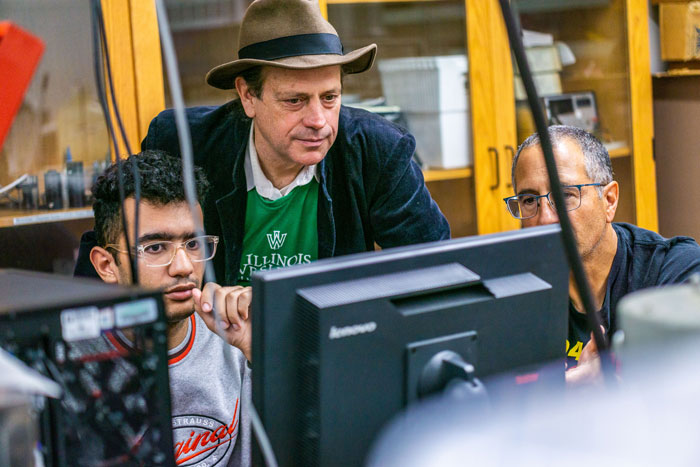
By Chris Francis '13
Kevin Hineline ‘88 is working with IWU physics students to develop a new cooking stove for use in the most impoverished and disaster-stricken regions of the world.
· · ·
“It sounded like someone dropped a steel bowl of nails on the floor of the plane,” Kevin Hineline ‘88 described to CBS news. There was an “understanding that the airport was secured by the UN, so I thought we were going to be safe… but I wasn’t able to even land.”
He was recounting his experience aboard a Spirit Airlines flight was fired on during its descent toward Port-au-Prince, the capital of Haiti. It isn’t known who carried out the attack, which caused minor injuries to a flight attendant. The plane was able to land in the Dominican Republic after the Port-au-Prince airport was shut down following the attack.
Even as Haiti’s government struggles to maintain control of a country that has, in the last four years, suffered the assassination of its president and a violent takeover by a coalition of gangs, Kevin and his organization, El Fuego del Sol, are working with IWU physics students to address one of Haiti’s most basic problems: safe cooking with sustainable fuel.
· · ·
Kevin co-founded El Fuego del Sol (FdS, Spanish for “the Fire of the Sun”, named for its creation as a solar power initiative) in the Dominican Republic in 2005, with Haitian social entrepreneur Frantz Fanfan, as an organization dedicated to solving social, economic and ecological challenges. Since then, the Dominican Republic has become a modern developmental success story, rising to become economically comparable to the other nations of the Caribbean.
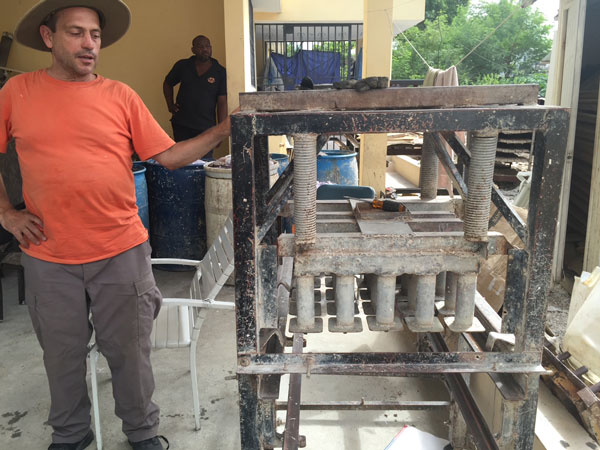
In that same time, Haiti, a former French colony that shares the island of Hispaniola with the Dominican Republic, has remained among the most impoverished nations in the world. Wracked by natural disasters, corruption, gang warfare and a legacy of abandonment by the world as a successfully rebellious slave colony, Haiti became the focus of FdS’s efforts in 2012 at the invitation of the World Food Program.
As for Kevin’s education and training, he’s a circus performer, and a systems psychologist.
“I still book shows with my son,” he said, while referring to a video of himself and his son, Lucas, practicing a stunt in which they do flips off of a kind of see-saw contraption, known as a “teeter-board”. “We can still perform around the country with lots of planning in advance.” He was introduced to the profession while studying theater at IWU.
He’s also a performing hypnotist, which ties more closely to his second major in psychology. Now, having spent two decades in international development, he also has a master’s degree in behavioral economics from The Chicago School of Professional Psychology, where he received special Academic Honors. But the academics he finds himself working with most today are physicists, after connecting with IWU Professor of Physics Gabe Spalding.
When Kevin’s son was thinking about where to study physics, Kevin took him to IWU’s campus to meet the faculty. Lucas eventually decided to attend ISU, where he could both study physics and advance his career as a circus performer, but Kevin’s meeting with Spalding sparked a promising new partnership between FdS and IWU’s physics department to help address a longstanding social and environmental issue in Haitian’s daily life.
· · ·
Haiti has spent most of its existence as an independent nation, since the Haitian Revolution’s conclusion in 1804, when it was cut off from the world economy. The legacy of that exclusion persists today as Haitians, especially in rural areas, are unable to use fuel like natural gas or propane for cooking. Instead, Haiti has an internal cottage industry of charcoal production.
Charcoal, while a useful means of creating a concentrated, controllable heat source for cooking, is far from an ideal fuel in the modern world. It is inefficient and ecologically damaging to make, taking 10 pounds of wood to produce one pound of charcoal, which also makes it more expensive than other fuel sources. And it is unhealthy, filling the air with smoke particles to which consistent exposure can cause respiratory illness, including lung cancer, and carrying the risk of carbon monoxide poisoning.
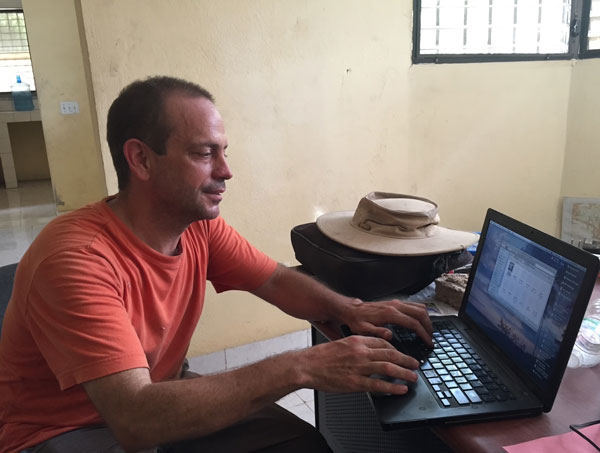
Kevin, when explaining his work in Haiti, first turns to a satellite map of Hispaniola to illustrate the effect of these problems.
“Look here,” he says while pointing to the border between Haiti and the Dominican Republic. “On the DR’s side, you can see where the forest is dark green, then that same forest on the Haitian side is lighter colored, because of all the deforestation.”
At the same time, Haiti has a significant problem with garbage management, as most waste is either dumped in ecologically unsafe landfills, or not properly disposed of to begin with.
To combine these problems into a single solution, Kevin first worked with the World Food Program to develop a new fuel source: briquettes made from recycled paper, cardboard, sawdust, sugarcane waste, coconut shells, corn husks, rice husks, wood chips, and anything else that can safely burn. Through FdS, local Haitians are employed to collect waste to then process with a small-scale, hand-operated factory line into compacted clumps about 4” x 4” x 1.5”.
“Lots of NGOs (non-governmental organizations) focus on just giving people things,” Kevin said, “like giving people food when there’s already farmers there who could be growing the food if they weren’t being driven out of business by the handouts. It creates a dependence on aid that’s bad for communities in the long run. We want to focus on what they need to become self-sufficient.”
Beyond sparing the degraded forests of Haiti, these briquettes are less labor-intensive to create than charcoal, and, with the greater efficiency comes greater ability for Haitians to focus on improving their lives.
“After we introduced the briquettes in one area, we saw a big increase in kids going to school there,” Kevin explained. “Before, families would usually only send ‘the smart boy’ to school while the others would help at home, including with collecting wood. Now most of the kids go to school.”
But their increased school attendance isn’t just a matter of having more time available. The school’s use of the briquettes also decreased their cooking fuel costs, allowing them to provide more meals, which drew more students.
Meanwhile, physics students at IWU are currently working on the next steps of the project with guidance from Spalding. “Environmental projects like Kevin’s give our students the opportunity to see what they can accomplish on a human scale, providing a clear path for making a positive difference,” he said.
· · ·
The briquettes are only part of the solution, and they hardly require the help of IWU physics students. The stoves that burn them are another matter.
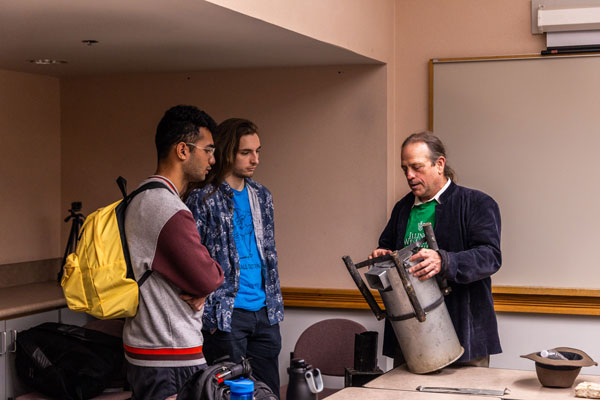
Most cooking in rural Haiti is done with a metallic grill over a fire pit. Much, if not most, of the heat from the fuel is lost as the charcoal burns to produce large amounts of carbon dioxide, carbon monoxide, and tiny smoke particles. But, after speaking with Spalding, Kevin formed a partnership with the IWU physics department to improve upon the stove designs that FdS has been building in Haiti — one that is efficient when cooking with the recycled briquettes, but, just as importantly, usable without an external power source and affordable at scale.
Designing this new stove would be a far more complicated task than creating a commercial grill. The typical charcoal grills used in backyards across America are designed for the social traditions of 4th of July weekends, not to maximize the efficient use of recycled fuel in both industrial and home cooking. And they certainly aren’t designed to do so with no power source and a shoestring budget.
“We implement our household stove program together with our school cooking program because the school is then the distribution location for both the stoves and the fuel briquettes,” Kevin explained, showing pictures of one of FdS’s earlier industrial stove designs meant to be 30 to 40 percent the cost of a similarly sized propane burning stove. Their current household stove model is sold at-cost to families for $50. “Our main stove production is for institutional use, such as schools, community centers, and crisis implementations globally.
Spalding explained, “In order to be appropriate to the Haitian community, the stoves need to be technologically simple, operating without any electric fans or sensors, but the challenges our students grapple with are actually quite advanced, requiring some of them to develop competency in computational fluid dynamics, for example, to solve the problem of how to feed oxygen into a larger version of the stove that might allow a school to reopen, or a local economy to restart. It's by really working through the details that our students learn how to have significant impacts.”
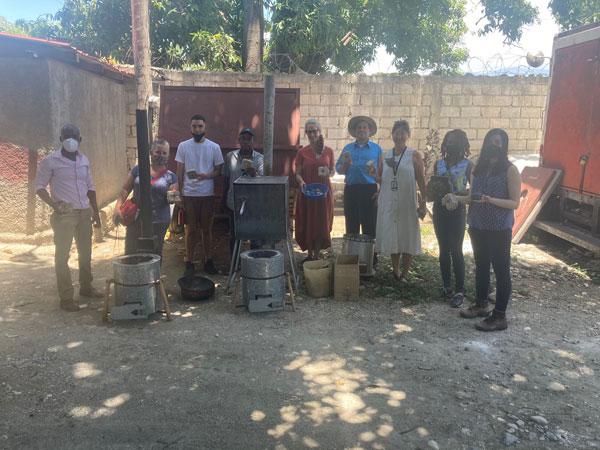
The IWU-improved stove design is still in its earliest stages, but, where the current FdS stoves are based on pre-existing designs, the science and engineering that IWU students bring to bear may be able to significantly increase the efficiency and safety of cooking both in Haiti and other regions where powerless cooking with recycled fuel is a necessity, such as refugee camps.
Kevin and Spalding’s partnership reinforces entrepreneurship, both commercial and social, as a headline feature of education at IWU, with many parties on campus eager to see how far Kevin and our students might go with this important project.
“Kevin's work with FdS embodies the kind of innovative, collaborative, and globally-minded projects we envision at Petrick,” said John Quarton, director of the Petrick Idea Center at IWU.
Fuego del Sol has won and been nominated for many awards for social entrepreneurship in climate solutions, thanks to its work with solar energy. The new hope is that, by helping impoverished communities in Haiti, as well as the environment as a whole, Kevin and IWU’s student innovators may earn more deserved accolades yet to come.
In the coming months the FdS team is expanding operations into the south of Haiti, in the community of Anse-a-Pitres, which due to its remote location has been spared from the political violence seen in much of Haiti. FdS is collaborating with several other NGOs including Surge for Water to implement a new drinking-water system under a recent grant from the Simmons Center for Global Chicago. Kevin sees his collaboration with the students, staff, and faculty of IWU as a major step toward the goal that Haitian FdS collaborators have shared: for the improved cooking concepts initiated in Haiti to be replicated and improve people’s lives around the world.